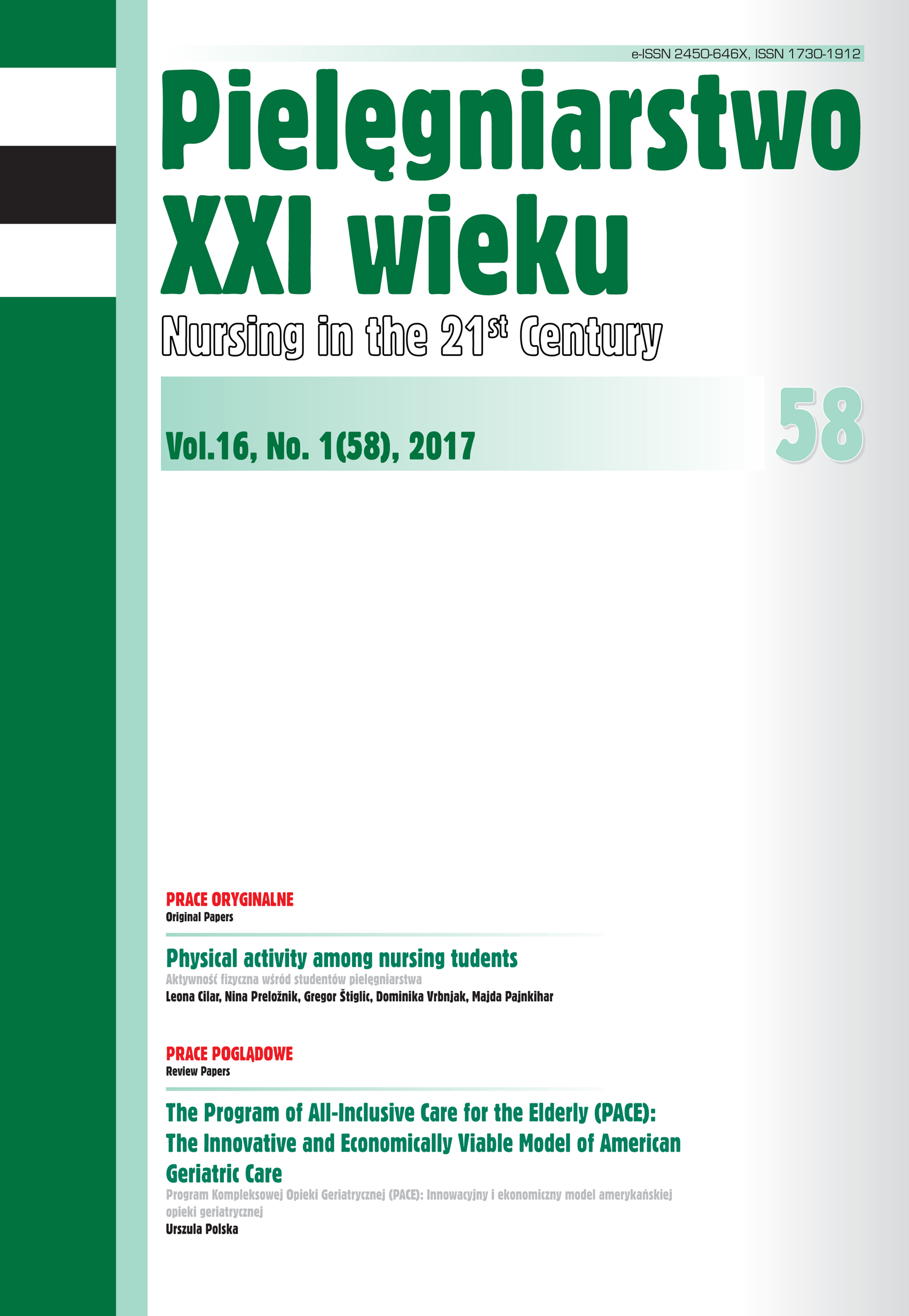Health concerns of women after mastectomy
DOI:
https://doi.org/10.1515/pielxxiw-2017-0001Keywords:
mastectomy, breast cancer, health concernsAbstract
HEALTH CONCERNS OF WOMEN AFTER MASTECTOMY
Introduction. Cancer and its treatment can cause serious mental and physical disorders that greatly limit the autonomy and independence of patients and reduce their quality of life. Mastectomy violates woman‘s image both in their self-assessment and in their public reception. Among the consequences after mastectomy, there are problems in the physical sphere, which reduce everyday activities, there also appear problems with the mental state associated with the reduction of the sense of feminity.
Aim. The aim of the study was to identify health concerns of women after mastectomy.
Material and methods. The study included 40 randomly selected women after mastectomy aged over 20. The research tool used in the study was the original survey, consisting of 28 questions. The questions were designed in order to gather information about the health concerns of women after mastectomy. The analysis was performed using Statistica software.
Results. The disease changed for worse lives in 55% of women after mastectomy; 35% reported no impact and 10% of respondents admitted that the disease changed their lives for the better. The number of 22.5% of interviewees complained of frequently occurring low mood, depression and sadness, while 52.5% have experienced these emotions sometimes. Approximately 90% of respondents have been using a breast prosthesis after mastectomy. As many as 72.5% of women reported decrease in physical fitness after surgery, while 27.5% did not experience any change.
Conclusions. The mastectomy procedure has a negative impact on physical and emotional state of women.
References
1. Murawa D, Dyzmann-Sroka A, Kycler W. i wsp. ABC raka piersi. Wielkopolskie Centrum Onkologii; 2010.
2. Jassem J, Krzakowski M. Rak piersi. Praktyczny przewodnik dla lekarzy. Gdańsk: Via Medica; 2014; s. 2-8.
3. Malicka I, Szczepańska J, Anioł K i wsp. Zaburzenia nastroju i strategie przystosowania do choroby u kobiet leczonych operacyjnie z powodu nowotworu piersi i narządów rodnych. Wspolczesna Onkol. 2009; 13 (1): 41-45.
4. Zegarski W, Głowacka I, Ostrowska Ż. Ocena jakości życia kobiet po mastektomii na podstawie standardowych kwestionariuszy: QLQ-C30 i QLQ-BR23. Nowotwory. 2010; 60 (6): 532-535.
5. Bulsa M, Rzepa T, Foszczyńska-Kłoda M i wsp. Stan psychiczny kobiet po mastektomii. Post Psychiatr Neurol. 2002; 11: 55-70.
6. Tchórzewska H. Rehabilitacja kobiet leczonych z powodu raka piersi. Poradnik. Warszawa: Federacja Stowarzyszeń Amazonki; 2007, s 10-39.
7. Kamusińska E, Ciosek M, Karwat I. Znaczenie rehabilitacji w leczeniu raka piersi. Stud Med. 2014; 30 (3): 214-220.
8. Mika K. Po odjęciu piersi. Warszawa: PZWL; 2005, s. 23-24.
9. Woźniewski M, Kornafel J. Rehabilitacja w onkologii. Wrocław: Elsevier Urban & Partner; 2010, s. 190.
10. Irzmańska-Hudziak A, Szadowska-Szlachetka Z, Charzyńska- Gula M, Chabros S. Występowanie objawów ubocznych leczenia cytostatykami a otrzymane wsparcie przez kobiety z rakiem piersi. J Health Sci. 2014; 4(15): 42-52.
11. Bergman P, Nowacka-Chiari E. Charakterystyka społeczno-środowiskowa kobiet po mastektomii. Fizjoterapia. 1997; 7: 24-26.
12. Wołowicka L (red): Jakość życia w naukach medycznych. Poznań: Akademia Medyczna; 2002.
13. Andrzejewski W, Kassolik K, Ochrymowicz M i wsp. Ocena jakości życia kobiet po mastektomii, zrzeszonych w Klubie Amazonek. Fizjoter Pol. 2008; 8: 51-64.
14. Fobair P, Stewart SL, Chang S, et al. Body image and sexual problems in young women with breast cancer. Psychooncology 2006; 15: 579-94.
15. Grajda T, Grodecka-Gazdecka S. Czynniki wpływające na jakość życia kobiet leczonych z powodu raka piersi. Przegl Ginekol Poł 2005; 5: 115-120.
16. Tchórzewska H. Rehabilitacja w leczeniu raka piersi. [w:] Pawlicki M, red: Rak piersi – nowe nadzieje i możliwości leczenia. Bielsko-Biała: Wyd. L-medica Press; 2002, s. 107.
17. Weitzner M.A. Funkcjonowanie psychospołeczne i jakość życia chorych na nowotwory gruczołu piersiowego. [w]: Meyza J, red: Jakość życia w chorobie nowotworowej. Warszawa: Wyd. Centrum Onkologii, Instytut M. Skłodowskiej-Curie; 1997, s. 225-248.
18. Hang J i wsp. Quality of life and satisfaction after breast cancer operations. Arch Gynecol Obstet. 2010; 282: 75-82.
19. Kulesza-Brończyk B i wsp. Jakość życia kobiet po leczeniu operacyjnym raka sutka. Zdr Publ. 2009; 119 (3): 293-297.
20. Chachaj A, Małyszczak K, Lukas J i wsp. Jakość życia kobiet z obrzękiem limfatycznym kończyny górnej po leczeniu raka piersi. Współcz Onkol. 2007; 11: 444-448.
Published
Issue
Section
License
Copyright (c) 2017 Authors

This work is licensed under a Creative Commons Attribution-NonCommercial-NoDerivatives 3.0 Unported License.




